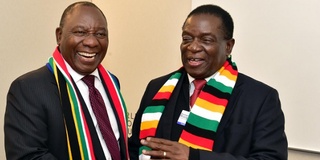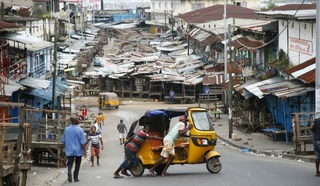News
Can Ramaphosa, Lourenço and Mnangagwa change Africa's fortunes?
If the leaders devote political capital to garnering new constituencies outside their traditional bases of power, it is a serious indication that they are agents of change.

Former President and CEO of the NEWSEUM, USA

Director, The Brenthurst Foundation


Over the last few months, something extraordinary has happened in Southern Africa: Three new leaders - Cyril Ramaphosa in South Africa, Emmerson Mnangagwa in Zimbabwe, and João Lourenço in Angola – armed with reformist agendas have succeeded rulers whose corruption and poor governance impoverished their lands. If they succeed, there will be renewed hope for the 100 million people who collectively live in those countries.
However, all three are from parties that have ruled since independence (1975 for Angola and 1980 for Zimbabwe) or the advent of non-racial rule in South Africa in 1994. These new leaders therefore face one of the great political quandaries: can they change the political orders that birthed them?
Ramaphosa’s accession to the presidency, after the forced resignation of Jacob Zuma, has raised hopes that the systemic theft and mismanagement that has afflicted South Africa since the advent of the Zuma administration in 2009 will be reversed.
Ramaphosa played a critical role in negotiating the end of apartheid. After the transition, he was “deployed” by President Nelson Mandela to the private sector where he became exceptionally rich on the basis of his connections and favorable business deals inspired by government’s desire to cultivate an African business elite. He became deputy president in 2014 but seemed to do little from the inside to counter Zuma’s rapacious rule. In his inaugural speech state of the nation address given shortly after becoming president, Ramaphosa nonetheless promised a “new dawn” and vowed, to “turn the tide of corruption in our public institutions.”
Mnangagwa, who became president in November 2017 after Robert Mugabe resigned in the face of a coup, was even more deeply intertwined with his predecessor. A stalwart of the ruling party ZANU-PF, he served Mugabe for decades and led, at various times, the ministries of State Security, Justice and Legal Affairs, and Defense before becoming vice president in 2014. He is deeply implicated in some of the most grievous human rights violations in the country’s history, including the massacres in the southwest that may have killed up to 20,000 people in the 1980’s, and has been greatly enriched by the ruling party’s stranglehold on the economy. Upon becoming president, he pledged “a new destiny” and vowed to combat corruption and create an economy that attracted foreign investment through good governance.
Lourenço, as the lead candidate of the ruling MPLA party, became President after the August 2017 elections. He succeeded José Eduardo dos Santos who had ruled for 38 years and had turned the country into a classic kleptocracy notable for how much oil revenue was diverted to the military and his family. Lourenço also has long been at the center of power, having been Secretary-General of the MPLA and Minister of Defense. In his inaugural speech, he promised to reduce the state’s role in the economy and vowed to fight corruption that he described as “rampant in some institutions.”
How to evaluate these new/old leaders? Too much optimism about men with history who confront extraordinarily difficult challenges is hardly warranted and will lead to a great deal of wasted aid and investment and, eventually to cynicism. However, undue skepticism is also problematic because serious reformers can be helped by outsiders and, should any of these leaders succeed in even part of their stated agendas, tens of millions would have better lives.
An early indication for the hard-headed but hopeful observer revolves around the old dictate that “personnel is policy.” Leaders cannot directly manage even a fraction of the reform process so who they appoint is telling. In this light, Lourenço took an exceedingly important step when he removed dos Santos’s daughter as chair of the state-owned oil company, the taproot of the elites’ wealth. Mnangagwa, on the other hand, appointed a cabinet that were largely retreads from the Mugabe years and missed an opportunity by not including members of the opposition. Ramaphosa has now appointed a cabinet that has a reformist economic team but also contains some politicians linked to Zuma and now a Deputy President who was previously notable for governing his own province in a suspect manner. The new leadership is an improvement on Zuma’s team but Ramaphosa missed the opportunity to clean house and signal a sharp break with the past, preferring to keep the party together rather than aggressively pursue a reform agenda.
Another important measure is to see if the new leaders reach out for new allies to support their rule. Reform is politically difficult because the losers in any transition, who were very recently the allies of those now in charge, know who they are immediately but the beneficiaries emerge slowly. If the leaders devote political capital to garnering new constituencies outside their traditional bases of power, it is a serious indication that they are agents of change.
A final gauge of leaders’ intentions is how they respond to the inevitable first crisis or disappointment. If they double down on the specifics of their new visions and empower those who are identified with change, there is more reason to be hopeful about their prospects.
Many African countries need to decisively break with the old order but transfers of power to rulers with deep roots in the dysfunctional past are still common. Should any of these leaders succeed, they would provide a powerful example that could propel a fresh reformist order across the African continent.
This article can also be found on BusinessLive.


